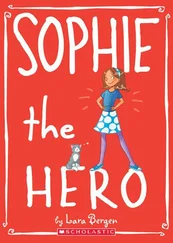Sergey’s father died six years ago. A heart attack. He’d complained of chest pain and was dead a couple of hours later. He died in their large Moscow apartment, not in bed, but on the couch, Sergey’s mother told him. On the very same couch where they used to watch TV together. Sergey had watched the evening news with his dad ever since he was five. He could barely understand what was going on on the screen, but the fact that he watched the news — along with the heft of their couch, its scratchy surface against the backs of his knees, its funky smell, his father’s warmth next to him, his father’s disgruntled sighs in reaction to the news, which Sergey sometimes imitated — made Sergey feel mature, important, special. Other kids watched Good Night, Kiddies! Sergey watched the evening news.
Sergey had been in New York when his father died. He got the news by phone. He and Vica left Eric with a neighbor and flew to Moscow for the funeral. Sergey saw his father’s body in the coffin and the coffin enter the chute of the crematorium oven, then held the urn with his father’s ashes in his hands. They flew back to New York two days after the funeral. When they got out of the taxi in the driveway of their Staten Island house, Sergey checked the mailbox. There was a heap of slightly soggy mail — they couldn’t get the mailbox door to close all the way — and in the midst of bills, statements, and all the “fantastic offers,” there was a letter from his father. Sergey checked the date — his father must have mailed it a few days before he died. Sergey waved away an angry Vica, stepped over their suitcases in the driveway, and went straight into the house and down to the basement to read the letter. It turned out to be a very ordinary letter. Sergey kept in touch with his mother via weekly phone calls, but his father disliked talking on the phone. When he did call, usually just to wish Sergey a happy birthday, there would be long pauses between his sentences, so long that Sergey would start to worry that the connection had been lost. “Dad?” Sergey would say, and his dad would sigh and answer, “Still here.” They preferred writing letters once a month. Sergey’s father was a retired math professor who detested a flowery style of writing, so his letters were always dry and to the point. He mostly listed the significant events of that month without bothering to describe them in detail.
Went fishing with Grisha Belik. He caught two large pikes. I caught one medium-size pike and one small catfish. The weather was good. They raised train fares once again. It used to be 18 rubles. Now it’s 22. Went to the concert hall with your mother. The program was good. All Beethoven…
The letter went on like this for the entire two pages and ended with the usual “Kiss you, Papa.” Sergey pored over it again and again, trying to find something between the lines, to decode some secret meaning, some last piece of advice. Was there any significance that the concert was all Beethoven? Or that the pike was medium-size and the catfish was small? No, there wasn’t. No significance whatsoever. It was the fact that the letter was written in his father’s voice that made the experience of reading it so powerful for Sergey. His father was gone, dead, yet his voice remained alive and unchanged: dry, skeptical, vaguely ironic. Sergey stayed in the basement reading every line over and over again, until Vica came down and smothered him with her warm damp hug.
Sergey happened to be between jobs at the time. He spent the weeks following his father’s death in the basement, rereading Fyodorov. He had always admired Fyodorov, but he had never found his works so relevant before. How should a grieving son conquer his despair? The lowest of the low would be to ignore his own looming mortality and lose himself in animal lust, to go binge-fucking until death was imminent. The best and most moral thing to do was to set to work on resurrecting the father. Not many people understood the importance of this aspect of Fyodorov’s philosophy.
Vica didn’t. “Digging for molecules in the dirt to bring your dead father back to life? With your sand pail and your little shovel? That sounds like stupid sci-fi for children.”
Regina didn’t get it either. “Resurrection of the fathers? What about the mothers?” The simple answer was that Fyodorov deemed women impure and worthless, but Sergey chose to keep that to himself. Fyodorov’s opinion of women clearly sprang from some deep personal trauma, and Sergey didn’t want it to discredit his philosophy.
Even Vadik never really got Fyodorov. “Wouldn’t you end up wasting your own life if you devoted all your efforts to resurrecting somebody else’s?”
No, Sergey tried to explain, not at all! Constant pursuit of immediate gratification was what made you waste your life. Concentrating your endeavors on restoring the essence of timeless humanity was going to give you much greater satisfaction than the fleeting pleasures of sex.
It was back then that Sergey had the first inkling of Virtual Grave. Fyodorov might have predicted genetic cloning, but he couldn’t have envisioned digital archiving. Atoms and molecules weren’t needed to resurrect the essence of people; words were enough. Words recorded in digital documents. E-mails, chats, texts, tweets. If you could just gather and process the textual artifacts produced by a certain person in one place and then sift through them looking for distinctive patterns, you could create a linguistic portrait of that person, which was equal to restoring his or her essence or, in other words, his or her soul. And once you did that, you could enable the restored essence of that person to communicate with his or her loved ones, to provide much-needed guidance and support. He even managed to impress Vica when he explained this idea to her. “Virtual voice,” she repeated with that familiar hungry glow in her eyes. “A powerful illusion. An extremely marketable illusion.”
The deafening whistle that signaled the ferry’s imminent arrival made Sergey jump. He walked across the crowded deck closer to the exit as the ferry made its uneasy way to the pier, screeching, groaning, bumping into the scruffy wooden boards. The ferry workers lowered the walkway onto the deck, and Sergey started to squeeze toward the exit along with the other sleepy, hungry, and cranky commuters.
He was almost sure that today would be his last day at Langley Miles. His recent evaluations had been pretty bad.
“Sergey needs to be more proactive and take more ownership of the projects he leads,” one said.
“Sergey needs to demonstrate improvement in human relations.”
“Sergey needs to react to criticism in more constructive ways.”
Back in Russia, when he first got that letter of acceptance from New York School of Business, Sergey imagined his future in a completely different way. He would sit in his roomy office alone, bending over his massive desk, reading, thinking, coming up with brilliant financial strategies. None of his fantasies had involved junior positions, difficult bosses, cubicles, bathroom passes, corporate parties, corporate birthdays, corporate community days, corporate baby showers, networking, adjusting, catering, fitting in. Failing to fit in.
His first disappointment was that New York School of Business wasn’t actually a very good school. His friends who’d praised it must have had New York University’s Stern School of Business in mind. He quickly discovered that great companies weren’t particularly eager to employ NYSB graduates.
Still, since Sergey had graduated at the top of his class, he did manage to find a decent first job. He worked as a financial analyst for Gray Bank. It was far from the job of his dreams, but it was a start. He worked there for two years and his evaluations had been consistently good. He used to make fun of them to Vica, and even quoted the most ridiculous passages in e-mails to Regina and Vadik, but he was secretly proud of them.
Читать дальше












